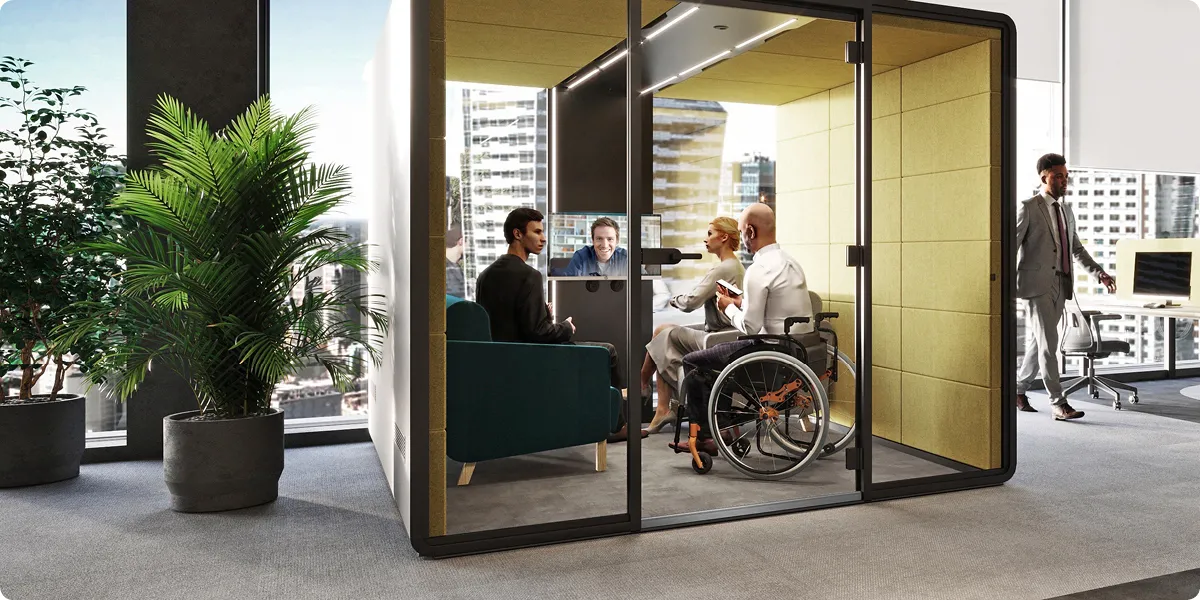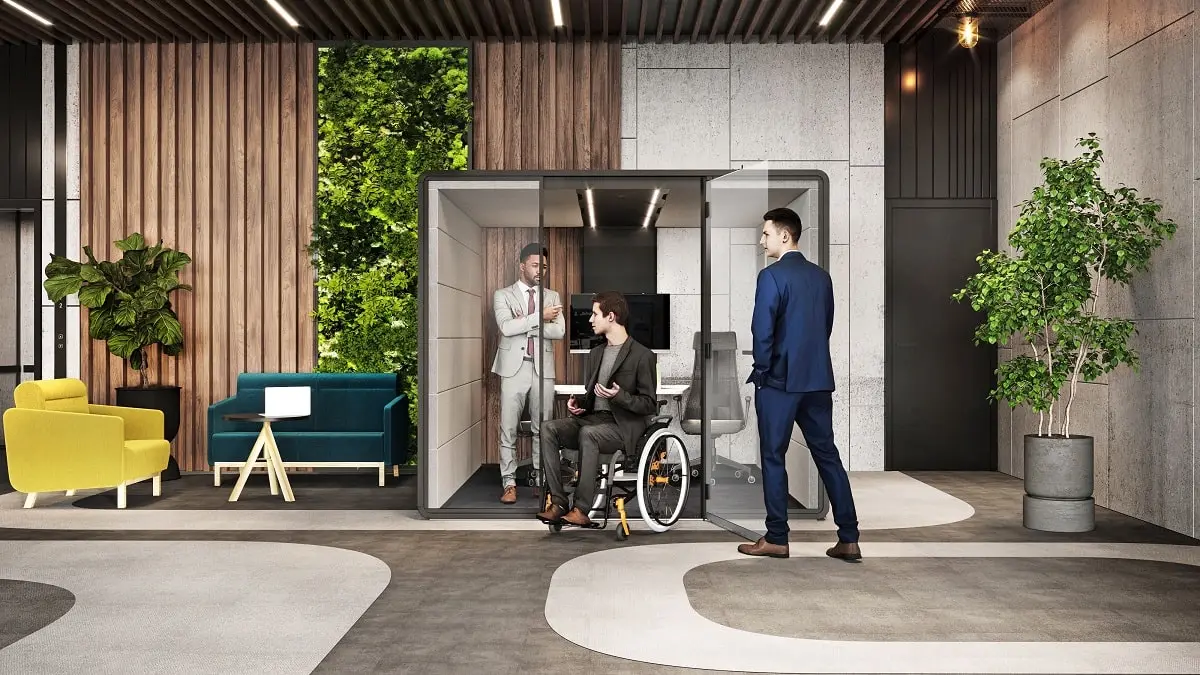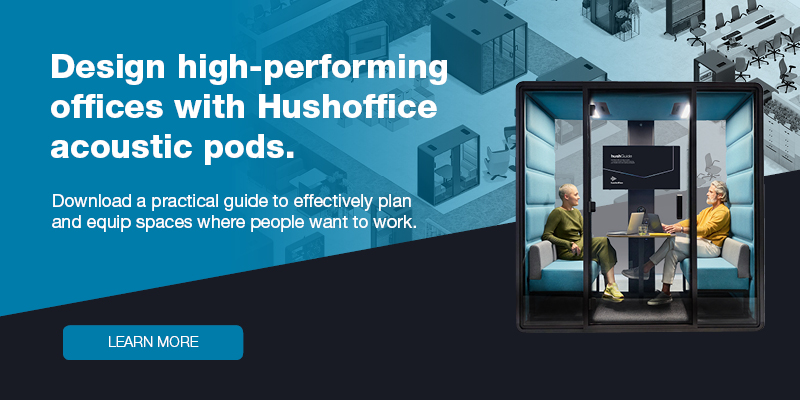How to support highly sensitive people (HSPs) in your office
- Posted on: 6 November 2022
- By: Hushoffice Team
Highly sensitive people (HSPs) are like sponges, ultra perceptive of details and subtleties. They’re greatly affected by social stimulation, by the office’s pulse. It gives them novel talents at work. How can the office best this 20% of the population?
Highly sensitive people (HSPs) are like sponges, ultra perceptive of details and subtleties. They’re greatly affected by social stimulation, by the office’s pulse. It gives them novel talents at work. How can the office best this 20% of the population?
Managers love the HSP’s thorough work style and caring nature. They’re meticulous and considerate of others’ needs. The catch-22: vulnerability to overload, especially on open, communal office floors, so electric with activity. So to support the highly sensitive, the office must provide privacy and quiet. Offering all three, plus mobility, Hushoffice pods are a promising solution
– says Mateusz Barczyk, Senior Brand Manager, Hushoffice.

HSPs are those high in a personality trait called “Sensory Processing Sensitivity.”
It gives them an increased nervous system response to physical, emotional, and social input. So they’re intensely affected by stimuli of all kinds, from hunger to flickering ceiling lights to a colleague’s body language.
They take in more information and reflect on it more intently than others.
This makes them hyper-observant. It also makes them more prone to overwhelm. It’s important to understand that high sensitivity is not a mental illness or a handicap, but a quality. One that brings both strengths and challenges.

Characteristics of an HSP range from introspectiveness to shyness.
Have you been told you’re too sensitive or overthink things? Do you have a keen feel for texture? Are you more captivated by movies than all your friends are? You may be an HSP.
- Frazzled by bright lights, loud sounds, powerful smells, or distinct textures
- Stressed out by tight deadlines
- Need to isolate at the end of a busy day
- Avoids violent entertainment
- Love for the finer things in life, like delicate tastes
- Deeply moved by art and beauty
- Touched by heartfelt stories
- Complex inner world
- Deemed shy or extremely sensitive as a child
Aron’s Highly Sensitive Persons Scale (HSPS). It’s a test developed by Elaine Aron, the American clinical research psychologist who coined the term “highly sensitive person.” She’s a self-described HSP who’s focused much of her work on understanding her kind.

Think about a solution like hushAccess.L — a sound-insulated conference booth seating 6, setting the perfect tone for focused teamwork.
Empathy. Conscientiousness. HSPs bring many special gifts to the workplace.
An HSP’s super-active mirror neurons make them acutely aware of others’ psychological states. So while sometimes written off as testy, they’re oh-so-emotionally intelligent. They’re mindful, creative thinkers. Treasured teammates if managed well and supported by their work environment
– says Mateusz Barczyk, Senior Brand Manager, Hushoffice.
The main hallmark of high sensitivity is the depth of processing. It’s what makes an HSP very aware and detail-oriented. They also tend to have great people skills, since they tune into others’ feelings naturally.


They might be exhausted by a work environment in which their peers are productive.

Both are a matter of catering to the whole range of preferences regarding lights, sounds, etcetera.
So open office layouts can be detrimental to a sensitive person’s productivity.
They need quiet to focus — privacy to ease into work. The lack of both causes anxiety, as they feel like they’re in a noisy fishbowl.
Let’s take a case. We know sensitive people are slower on the uptake since they process more information. In moments, it may appear as if an HSP employee is slacking when, in reality, they’re chewing on the problem. They feel self-conscious and discouraged from taking their time. The solution is privacy. Give them a workspace with isolation — a one-person work pod like hushHybrid. They’ll be able to go at their own pace without worry of being judged
– lends Mateusz Barczyk, Senior Brand Manager, Hushoffice.

To be inclusive, the office must offer private workspaces like booths and pods.
Spaces with a low amount of stimuli where your sensitive employees can retreat, detoxing from office hustle periodically. Meeting booths and work pods are the right ideas.
Giving them adequate workspaces can turn your HSPs into MVPs.
They’ll be free to flow through work their own way, savoring a personal bubble with minimal disturbances. Acoustic, blocking out office noise, booths and pods are excellent products to look into. They’re like pleasant dens of concentration. An HSP’s choice work environment.
Check out our Hushoffice collection of booths and pods. And leave us a note if you have any questions 🙂
Highly sensitive persons in the office – frequently asked questions.
What are the signs of a highly sensitive person?
You may be an HSP if you’re intensely affected by lights, sounds, smells, and textures. If you’re strained by deadlines. If you’re drawn to the finer things in life, like specific flavors. If you’re deeply moved by art and heartfelt stories. If you need to isolate yourself at the end of busy days; if you avoid violent movies and music; if you have a complex inner world. If you were a shy or testy child. All these are hallmarks of an HSP.
How can the office support highly sensitive people (HSPs)?
To satisfy the HSP’s need for quietude, give them private workspaces. They’ll be able to catch breaks from the office hustle and focus without interruption. Meeting booths and work pods work wonderfully, as they’re acoustically flawless and totally contained, offering a complete retreat from the floor.
What do sensitive people need from the office to thrive?
They need private workspaces. Sensitive people take in more information from their surroundings. They also process it more deeply than others. This makes them susceptible to overload. So what they need is intermittent breaks from social and environmental stimuli throughout their workday. Booths and pods can help, as they offer peaceful refuge from the floor’s activity (see the Hushoffice collection).







